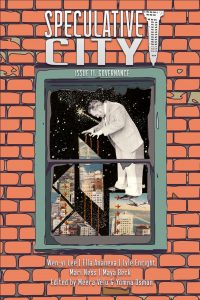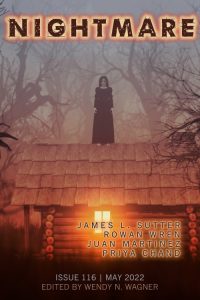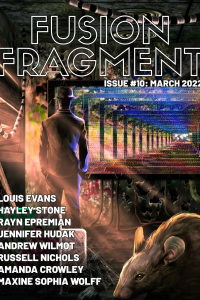Karen Burnham Reviews Short Fiction: Lightspeed, Futures, Abyss & Apex, Lackington’s, and Speculative City
 Lightspeed 10/21
Lightspeed 10/21
Nature: Futures 9/17/21
Abyss & Apex Summer ’21
Lackington’s Spring ’21
Speculative City Spring ’21
The fantasy side of the October issue of Lightspeed brings us a novelette by PH Lee & Rachel Swirsky, continuing their Dusty Boots series of fairytale-style stories. ‘‘The Ash-Girl and the Salmon Prince’’ blends Cinderella tropes with The Fisherman and His Wife and a hint of Bluebeard. The ash-girl is so ignored by her parents in favor of her two beautiful sisters that when the father saves the life of a magic salmon, who requests a wife in order to grant them more wishes, they’re more than happy to send this youngest girl to him. Luckily she and the salmon are a wonderful match and live very happily together. Twice she starts to miss her family and decides to visit them, and both times her mother reminds us and her just what a horrible person she is. The salmon can barely imagine why his wife still cares for these people, but very much wants her to be happy. In the end there may be a way to fulfill everyone’s wishes, but can the mother bend so far? I’ve been enjoying all the Dusty Boots stories, and this is honestly less dark than some of the others. The flash piece is ‘‘The Right Dragon’’ by Coral Alejandra Moore. A blacksmith is deeply in love with Marisol, a woman who lost an arm and a sister to a dragon. The blacksmith follows her as she dispatches dragon after dragon, but apparently none were the right one. Lightspeed’s science fiction side has one of those delightful stories told in the form of corporate memos, “Memoranda from the End of the World” by Gene Doucette. This time an alien pathogen has gotten loose and we progress from “RE: YOUR COMPANY-ISSUED BREATHING APPARATUS” to “RE: SAYING GOODBYE TO OUR SOUTHWESTERN CORPORATE CAMPUS” to the Galactic Corporation at [Untranslatable] sending out messages such as “NOTICE OF IMPENDING FUMIGATION.”
There’s something about corporate-speak that always makes it ripe for satire, and another author who takes advantage of that in September is Aimee Picchi with “Emergency Housekeeping Rules for the SS Heart of the Sun” in Nature: Futures. In this email from the captain we learn all the ways that we should not do what Ensign Able did, in terms of eating something he really shouldn’t have and then working to convert other crew members to the mindset of the Tentacline Empire. After all, no matter what he says, dark-matter harvesting is still illegal because it will lead to the collapse of the Universe, but debating this with him will only make him more certain of the deliciousness of dark matter. The captain here is freer in her vocabulary than the more officious corporation in Doucette’s story, but this form remains a genuinely fun way to tell a tall tale.
Every time I pick up an issue of Abyss & Apex I regret how many of them I miss. My favorite fantasy premise of the issue comes in “Tempus Reverso” by Ember Randall, which deals with fae civil rights. In an alt-Victorian Londinius, Rowan uses magic to briefly reverse time and save Helena, her close friend and a political figure. Legislation passes that will require fae registration, and while Rowan can pass for human, things get ugly quickly. Helena has been fighting this legal turn of events, but eventually Rowan will have to get past her fiercely personal feelings for Helena to let things take a different course. My favorite science fictional premise comes in “Deadhead” by Maggie Slater. A company is experimenting with technology that will let them control a body via AI while its host’s consciousness is absent, either due to brain injury or voluntarily. Shira is working for the company after her brother becomes one of its test subjects due to an accident. His body has never been better taken care of (one of the selling points is to let rich clients “check out” of their bodies and come back to them in perfect shape), but it’s clearly not the same as having her brother back. In a parallel narrative, Kyle has been pretending to be his own AI replacement for complicated reasons involving being a constant disappointment to his mother, who thinks his AI version is much better than her original son was. There’s a lot of complicated personal tangles here, and maybe some healing on offer at the end. Another strong story is “The Mama Puzzle” by Emmalia Harrington. Yide and her twin Erde live on a Chinese space station with their grandparents while their parents (a Chinese man and a Black woman) work elsewhere. Yide is the darker of the twins while Erde looks more Chinese, and so Yide bears the brunt of her teachers’ racism. When they’re assigned to do reports on their family history, Erde naturally gets the Chinese side with easily accessible information, while Yide has trouble finding anything about their mother’s side. Yide is despairing, but family sometimes wins out.
The theme for the Spring issue of Lackington’s is “Battles,” which brings a wide variety of stories to its pages. The two stories in the most pre-Tolkien heroic mode are “A Sleepless Hunter’s Wanton Fruit” by dave ring and “Sir Balin the Savage and Good Sir Balan” by Craig Hinds. ring’s story has more than a little of the lush prose and dream-like narrative of Lord Dunsany, as a furred hero Rudgar is on a quest to defeat the dreaming beast. In a land of fox people and wolf people and others, the sexual mores are quite a bit different than Dunsany probably could have countenanced, but it’s the quest that’s the thing, and “defeat” can take many different meanings. Hinds’s story is in the full-blown Arthurian mode, but it also has more than a touch of the surreal about it as cursed Balin and his good twin Balan are separated, with Balin moving through the Wasteland after his role in the Fisher King legend plays out, and only reuniting with Balan in tragic circumstances. In a much more liberal interpretation of the theme, we get “Synesthesia” by Devin DeMarco, which imagines a world in which people with synesthesia can manifest what they perceive – for instance a person touching a particular texture could cause sounds to be heard by everyone, or someone smelling a particular odor could cause light bursts, shards, or oozing colors to appear. So of course they make a three-on-three sport out of it, and we follow the underfunded La Crosse Riverrunners in their game against the better resourced and devious Chicago Falcons as they use their various sensation manifestation abilities to try to knock down or drag out their opponents. A good choice of narrative voice makes a potentially hard-to-make-sense-of premise much more fun, and it’s also the right length for the job.
I have a long-standing complaint that speculative fiction tends to spend more time focused on the courtly and imperial politics of fantasy and space opera empires than on the realities of living in a constitutional republic. So I am glad that Speculative City produced a theme issue on “Governance,” and by far my favorite story in it is “The 74th District” by Wen-Yi Lee. Jaime is a recent graduate in philosophy with a bit of public policy experience when the mayor asks her to take over administration of the city’s newest district. It’s the one where they’ve been housing resurrected citizens after necromancy starts working, and Jaime is the only living resident. She’s got an assistant and the city council schedule and one-on-one meetings to address constituent concerns. The plot kicks in when one of her old classmates comes schmoozing by to pitch the idea of locating a toxic waste dump in her district, for obvious reasons. She has to think of a way to protect her residents, the Recently Returned that everyone else would like to ignore, and she has to do it fast. I appreciate this story of a dedicated public servant using her position to do some good, even in very strange circumstances.
Recommended Stories
“The Ash-Girl and the Salmon Prince”, PH Lee & Rachel Swirsky (Lightspeed 10/21)
“The 74th District”, Wen-Yi Lee (Speculative City #11)
“A Sleepless Hunter’s Wanton Fruit”, dave ring (Lackington’s #23)
“Deadhead”, Maggie Slater (Abyss & Apex Spring ’21)
Karen Burnham is an electromagnetics engineer by way of vocation, and a book reviewer/critic by way of avocation. She has worked on NASA projects including the Dream Chaser spacecraft and currently works in the automotive industry in Michigan. She has reviewed for venues such as Locus Magazine, NYRSF, Strange Horizons, SFSignal.com, and Cascadia Subduction Zone. She has produced podcasts for Locusmag.com and SFSignal.com, especially SF Crossing the Gulf with Karen Lord. Her book on Greg Egan came out from University of Illinois Press in 2014, and she has twice been nominated in the Best Non-Fiction category of the British SF Awards.
This review and more like it in the November 2021 issue of Locus.
 While you are here, please take a moment to support Locus with a one-time or recurring donation. We rely on reader donations to keep the magazine and site going, and would like to keep the site paywall free, but WE NEED YOUR FINANCIAL SUPPORT to continue quality coverage of the science fiction and fantasy field.
While you are here, please take a moment to support Locus with a one-time or recurring donation. We rely on reader donations to keep the magazine and site going, and would like to keep the site paywall free, but WE NEED YOUR FINANCIAL SUPPORT to continue quality coverage of the science fiction and fantasy field.
©Locus Magazine. Copyrighted material may not be republished without permission of LSFF.






